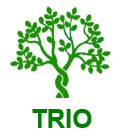By Erica Ho, Senior Research and Education Associate
Post-transplant cancer (PTC) is one of the leading causes of death among organ and tissue transplant recipients. This is because the immunosuppressive medicines recipients need to take to prevent graft rejection weakens their immune system, increasing their risk of developing cancer by 2-3 times compared to the general population.1 However, many cancers, if detected early enough, can be treated and transplant recipients can continue living long and healthy lives. To assist transplant recipients in being diligent and proactive about their cancer risk, Transplant Recipients International Organization (TRIO), a non-profit dedicated to improving the quality of life for transplant candidates, recipients, donors, and their families, has created the Post-Transplant Cancer Project. The PTC Project is a web-based educational resource where transplant patients and recipients can learn about what their risk of cancer is and how to effectively prevent and manage it. The motivation behind the development of this resource came from TRIO members noticing a high number of their community dying from cancer after receiving a transplant. This website, subsequently, was created to raise awareness about PTC and encourage transplant recipients to be diligent in managing their risk and monitoring for signs of cancer. The website has been created with the help of medical professionals, health literacy experts, health educators from TREC, and members of the TRIO community.
Visitors on the website can navigate four main sections of the site: LEARN the Risk Factors, LOOK for Symptoms, LIVE a More Proactive Life, and LINK to More Resources. Each of these sections are further divided into different pages for different types of transplant or different types of cancer. Visitors interested in a topic can view the corresponding webpage and reinforce the material they just learned with interactive quizzes at the bottom of every page. In addition to health literate, medically vetted content and quizzes, the website contains medical expert videos, personal stories, and blog articles. The developers of this resource hope that transplant patients and recipients use this website to become more aware of their PTC risks and be proactive in preventing, monitoring, or treating PTC. With improved education and awareness, the rate of PTC-associated deaths can be prevented, allowing transplant recipients to continue living longer and healthier lives.
In order for health education to be effective in guiding patients to make confident and informed choices, learning resources should be health literate, accessible, and patient-centered. The PTC Project is just one example of this. Patients who are more engaged and knowledgeable about their own health are shown to have better health outcomes.2 By facilitating and supporting the development of the PTC Project, the involved TRIO members raised awareness about a problem insufficiently addressed and taught about by their healthcare providers, and have now made a novel contribution to the transplant community. The PTC Project undergoes regular site updates in order to provide the best possible educational experience for visitors. However, even soon after its official launch, feedback provided by both patient and provider users has already shown a great interest in the resource, with several users commending it as a unique and life-saving resource for transplant recipients.
- Francis A, Au E, Lim WH, Wong G. Post-transplant cancer: An epidemiological evaluation. Journal of Onco-Nephrology. 2020;4(3):145-152.
- Waterman AD, Gleason J, Lerminiaux L, et al. Amplifying the Patient Voice: Key Priorities and Opportunities for Improved Transplant and Living Donor Advocacy and Outcomes During COVID-19 and Beyond. Curr Transplant Rep. 2020:1-10.

